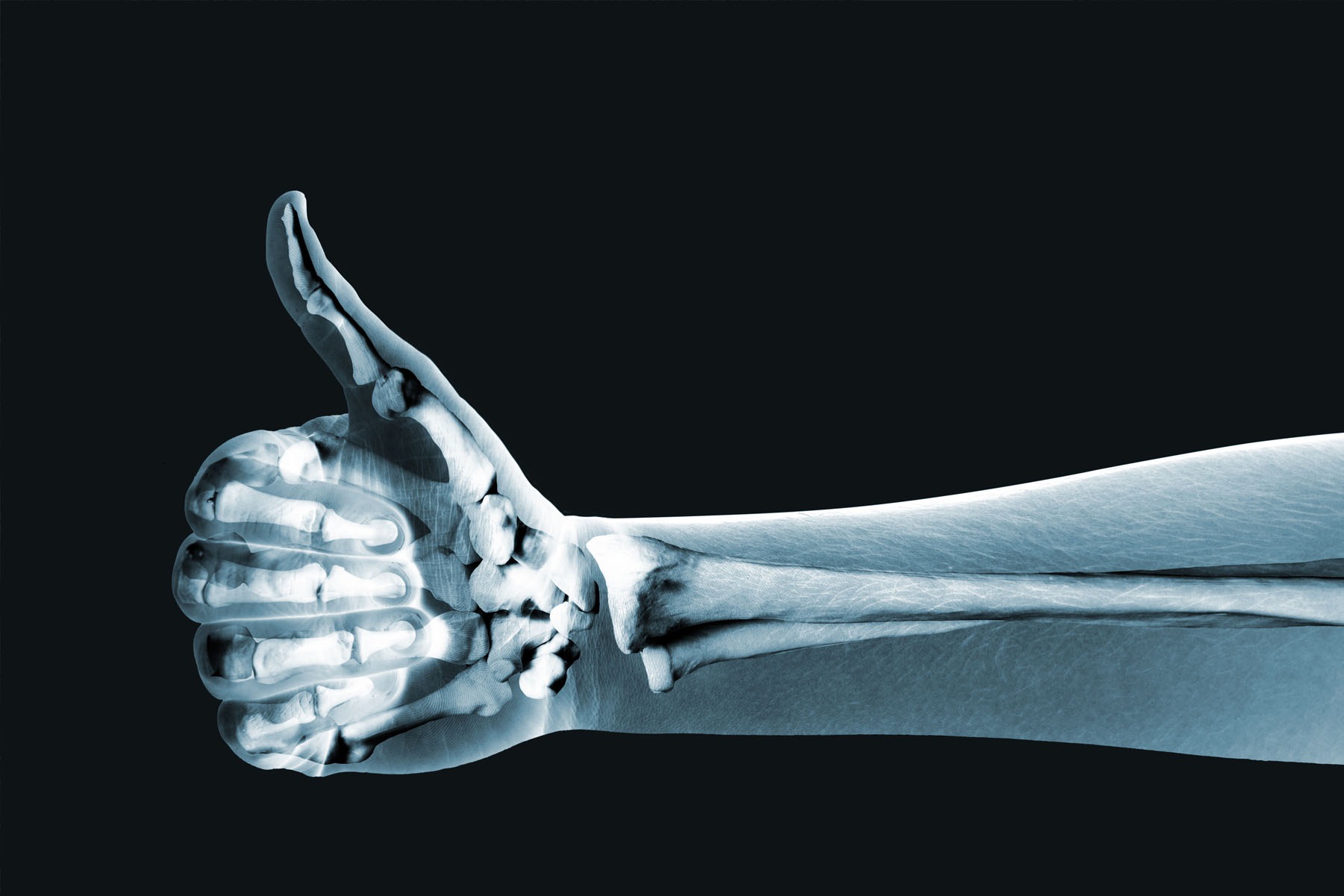

Featured
How Does Vitamin A Affect Bone Health?
Published: September 3, 2023
Discover how vitamin A affects bone health and why it is featured as an important element in maintaining strong and healthy bones.
Introduction
Vitamin A is a crucial nutrient that plays a significant role in various aspects of our health, including maintaining the integrity and strength of our bones. While many are aware of the benefits of vitamin A for vision and immune function, its impact on bone health is often overlooked. In this article, we will explore the relationship between vitamin A and bone health, examining how this essential nutrient affects the cells responsible for bone formation and breakdown, as well as the balance of calcium in the body.
Before delving into the specifics, it is essential to understand the two main types of vitamin A: retinoids and carotenoids. Retinoids, such as retinol, retinal, and retinoic acid, are found in animal sources such as liver, eggs, and dairy products. On the other hand, carotenoids, including beta-carotene, lycopene, and lutein, are plant-based pigments that can be converted into vitamin A by the body.
Bone health is a vital aspect of overall well-being. Our skeletal system provides structural support, protects organs, and helps to facilitate movement. However, bones are not static structures; they are in a constant state of remodeling. This remodeling process involves the constant formation of new bone tissue by specialized cells called osteoblasts and the removal of old or damaged bone tissue by osteoclasts.
Vitamin A plays a crucial role in maintaining this delicate balance between bone formation and breakdown. It supports the activity of osteoblasts, which are responsible for producing new bone tissue. At the same time, it regulates the activity of osteoclasts, which are involved in the breakdown of old bone tissue. Additionally, vitamin A also influences calcium metabolism, a vital mineral necessary for bone strength and density.
In the following sections, we will explore how vitamin A affects the function of osteoblasts and osteoclasts, its role in calcium balance, the consequences of vitamin A deficiency and toxicity on bone health, and conclude with the importance of maintaining adequate vitamin A levels for optimal bone health.
Role of Vitamin A in Bone Health
Vitamin A is a vital nutrient that plays a crucial role in maintaining optimal bone health. It is involved in various processes necessary for the development, maintenance, and repair of bones. Let’s explore the specific ways in which vitamin A influences bone health.
First and foremost, vitamin A supports the activity of osteoblasts, which are the cells responsible for building new bone tissue. Osteoblasts produce collagen, a protein that forms the structural framework of bones. Vitamin A helps in the synthesis of collagen, thereby contributing to the overall strength and integrity of bones.
Furthermore, vitamin A regulates the activity of osteoclasts, which are responsible for breaking down old or damaged bone tissue. By maintaining a balance between osteoblast and osteoclast activity, vitamin A ensures that bone remodeling occurs effectively, allowing for the removal of old bone tissue while simultaneously forming new bone tissue.
Vitamin A also plays a crucial role in calcium balance, which is essential for maintaining bone mineralization. Calcium is a key mineral required for the strength and density of bones. Vitamin A helps in the absorption and utilization of calcium from the diet, allowing it to be utilized by the body for various functions, including bone health.
Additionally, vitamin A supports the production of osteocalcin, a protein involved in mineralizing bone tissue. Osteocalcin binds to calcium ions, facilitating their incorporation into the bone matrix and ultimately enhancing bone strength.
In summary, the role of vitamin A in bone health is multifaceted. It supports the activity of osteoblasts, regulates osteoclast activity, aids in calcium balance, and promotes the production of osteocalcin. All of these mechanisms contribute to the maintenance of strong and healthy bones.
Vitamin A and Osteoblasts
Osteoblasts are specialized cells responsible for the formation and deposition of new bone tissue. They play a crucial role in maintaining bone health by producing collagen, a protein that provides the structural framework for bones. Vitamin A is essential for supporting the activity of osteoblasts and promoting optimal bone formation.
One of the ways in which vitamin A influences osteoblasts is by regulating gene expression. It activates specific genes that promote osteoblast differentiation and maturation. By doing so, vitamin A ensures the proper development of osteoblasts, allowing them to carry out their function effectively.
In addition to gene regulation, vitamin A also enhances the synthesis of collagen by osteoblasts. Collagen is the primary component of the extracellular matrix in bones, providing tensile strength and flexibility. Vitamin A promotes the production of collagen, contributing to the overall structural integrity and strength of bones.
Furthermore, vitamin A stimulates the production of alkaline phosphatase, an enzyme that plays a key role in bone mineralization. Alkaline phosphatase is instrumental in the deposition of calcium and phosphate ions into the bone matrix, leading to proper mineralization and increased bone density.
It is worth noting that while vitamin A is essential for bone health, excessive levels can be detrimental. Excessive vitamin A intake can disrupt the delicate balance between osteoblast and osteoclast activity, leading to bone loss and impaired bone formation.
In summary, vitamin A plays a critical role in promoting the activity and function of osteoblasts. It regulates gene expression, enhances collagen synthesis, and stimulates the production of alkaline phosphatase. By supporting osteoblasts, vitamin A contributes to the formation of strong and healthy bones.
Vitamin A and Osteoclasts
Osteoclasts are specialized cells responsible for the breakdown and resorption of old or damaged bone tissue. While osteoblasts are involved in bone formation, osteoclasts are essential for maintaining bone remodeling and turnover. Vitamin A plays a significant role in regulating the activity of osteoclasts and ensuring the efficient removal of old bone tissue.
Vitamin A inhibits the differentiation and activity of osteoclasts, preventing excessive bone resorption. It does so by suppressing the expression of certain genes involved in osteoclast formation and function. This regulation helps to maintain a healthy balance between osteoblast and osteoclast activity, preventing bone loss and promoting overall bone health.
Furthermore, vitamin A modulates the production of signaling molecules, such as receptor activator of nuclear factor-kappa B ligand (RANKL) and osteoprotegerin (OPG), which play a significant role in osteoclast function. RANKL promotes the formation and activation of osteoclasts, while OPG acts as a decoy receptor, binding to RANKL and inhibiting its activity. Vitamin A helps to maintain a proper balance between RANKL and OPG, ensuring healthy osteoclast function.
It is important to note that excessive intake of vitamin A can lead to bone loss and impairment of osteoclast activity. High levels of vitamin A can disrupt the delicate balance between osteoblast and osteoclast activity, resulting in decreased bone density and increased risk of fractures.
In summary, vitamin A influences osteoclast activity by inhibiting their differentiation and modulating the production of important signaling molecules. By regulating osteoclast function, vitamin A helps to maintain a healthy bone remodeling process, ensuring the removal of old bone tissue while allowing for the formation of new bone tissue.
Vitamin A and Calcium Balance
Calcium is a vital mineral for maintaining strong and healthy bones. It is essential for bone mineralization and plays a crucial role in various physiological processes. Vitamin A is intricately involved in regulating calcium balance within the body, ensuring adequate levels for optimal bone health.
Vitamin A aids in the absorption and utilization of calcium from the diet. It enhances the production of a protein called calbindin-D, which facilitates the transport of calcium across the intestinal lining, allowing for its absorption into the bloodstream. Vitamin A also promotes the synthesis of another protein called calcium-binding protein, which aids in the transport of calcium within cells.
Furthermore, vitamin A is involved in regulating the levels of parathyroid hormone (PTH) and calcitonin, two hormones that play crucial roles in calcium metabolism. PTH stimulates the release of calcium from bones into the bloodstream, while calcitonin helps to lower blood calcium levels by promoting calcium deposition in bone tissue. Vitamin A helps maintain the delicate balance between these hormones, ensuring appropriate calcium levels for bone health.
In addition to facilitating calcium absorption and metabolism, vitamin A also influences the activity of vitamin D, another important nutrient for bone health. Vitamin D plays a vital role in calcium absorption in the intestines and calcium reabsorption in the kidneys. Vitamin A supports the conversion of vitamin D into its active form, ensuring its optimal function in calcium regulation.
It is important to note that both vitamin A deficiency and excess can disrupt calcium balance and compromise bone health. A deficiency in vitamin A can lead to impaired calcium absorption, while excess vitamin A intake can interfere with vitamin D metabolism, hindering calcium utilization.
In summary, vitamin A plays a significant role in maintaining calcium balance within the body. It enhances calcium absorption, influences calcium metabolism hormones, and supports the activity of vitamin D. By regulating calcium levels, vitamin A contributes to the overall strength and density of bones.
Vitamin A Deficiency and Bone Health
Vitamin A deficiency can have detrimental effects on bone health. Without adequate levels of vitamin A, the normal functioning of osteoblasts and osteoclasts, the cells responsible for bone formation and breakdown, is compromised.
When there is a deficiency of vitamin A, osteoblast function is impaired. The synthesis of collagen, the protein necessary for bone structural integrity, is diminished, leading to weakened bones and increased susceptibility to fractures. Additionally, the production of alkaline phosphatase, an enzyme crucial for bone mineralization, is reduced, resulting in poor mineralization and decreased bone density.
Furthermore, vitamin A deficiency disrupts the balance between osteoblasts and osteoclasts. Without sufficient vitamin A, osteoclast formation and activity may be increased, leading to excessive bone resorption. This imbalance between bone formation and breakdown can result in decreased bone density and the development of osteoporosis.
Additionally, vitamin A deficiency affects calcium metabolism. It impairs the absorption of calcium from the intestines, leading to reduced calcium levels in the bloodstream. This prompts the release of parathyroid hormone (PTH), which triggers the release of calcium from bones to maintain adequate blood calcium levels. As a result, bones may become weakened over time due to ongoing calcium loss.
Other symptoms of vitamin A deficiency, such as impaired vision, weakened immune function, and poor growth and development, can indirectly impact bone health. When the body is deficient in essential nutrients, including vitamin A, overall health is compromised, making it more challenging for the body to maintain strong and healthy bones.
In summary, a deficiency in vitamin A can negatively impact bone health by impairing osteoblast function, enhancing osteoclast activity, and disrupting calcium balance. Adequate intake of vitamin A is essential for the proper functioning of bone cells and the maintenance of optimal bone density.
Vitamin A Toxicity and Bone Health
While vitamin A is essential for bone health, excessive intake can lead to vitamin A toxicity, which can have detrimental effects on the skeletal system.
Excessive levels of vitamin A can disrupt the delicate balance between bone formation and breakdown. It can negatively impact osteoblast function, leading to impaired collagen synthesis and decreased bone formation. This can result in weakened bones that are more prone to fractures.
Furthermore, vitamin A toxicity can enhance osteoclast activity, leading to increased bone resorption. Excessive osteoclast activity can result in accelerated bone loss and decreased bone density. Over time, this can lead to the development of osteoporosis, a condition characterized by fragile and brittle bones.
Additionally, vitamin A toxicity can interfere with calcium metabolism. It can disrupt the normal regulation of calcium levels in the body, leading to imbalances that can affect bone health. Excessive vitamin A intake may interfere with the production and action of parathyroid hormone (PTH) and calcitonin, hormones involved in maintaining appropriate calcium levels in the blood and bones.
It is important to note that vitamin A toxicity is more likely to occur from consuming excessive amounts of preformed vitamin A from animal sources, such as liver and fortified foods, rather than from carotenoids, which are converted to vitamin A in the body.
Symptoms of vitamin A toxicity can also include bone pain, joint stiffness, and increased risk of fractures. It is crucial to be mindful of the recommended daily intake of vitamin A and avoid excessive supplementation without medical advice.
In summary, excessive intake of vitamin A can lead to toxicity and adversely affect bone health. It can impair osteoblast function, enhance osteoclast activity, and disrupt calcium metabolism. It is essential to maintain a balance and avoid excessive intake to ensure optimal bone health.
Conclusion
Vitamin A plays a critical role in maintaining optimal bone health. It supports the activity of osteoblasts, the cells responsible for bone formation, and regulates the activity of osteoclasts, the cells involved in bone resorption. Additionally, vitamin A influences calcium balance, a crucial mineral necessary for bone strength and density.
A deficiency in vitamin A can lead to impaired bone formation, increased bone resorption, and disrupted calcium metabolism, resulting in weakened bones and an increased risk of fractures. Conversely, excessive intake of vitamin A can lead to toxicity, which can also negatively impact bone health by disrupting the delicate balance between bone formation and breakdown.
It is essential to maintain a balanced and adequate intake of vitamin A to support optimal bone health. This can be achieved through a diet rich in vitamin A-rich foods, such as liver, eggs, dairy products, and orange and yellow fruits and vegetables. However, it is important to avoid excessive supplementation without medical advice.
Incorporating a well-rounded, nutrient-rich diet that includes vitamin A, along with other essential nutrients, is key to promoting overall bone health. Taking care of our bones is crucial for maintaining mobility, preventing fractures, and ensuring a high quality of life. By understanding the role of vitamin A in bone health and taking the necessary steps to maintain adequate levels, we can support the strength and integrity of our bones throughout our lives.









